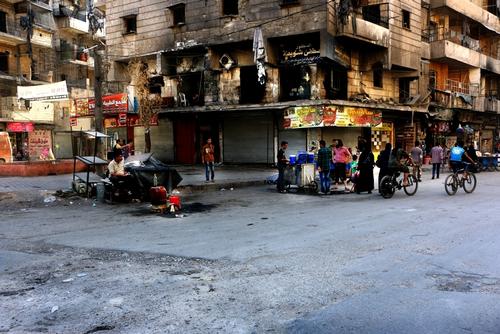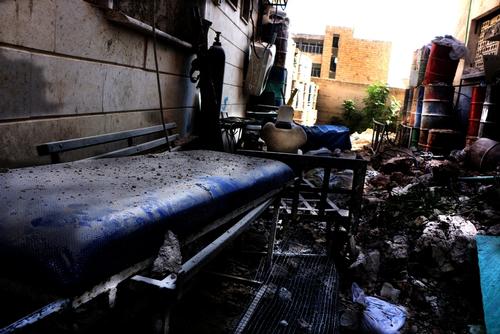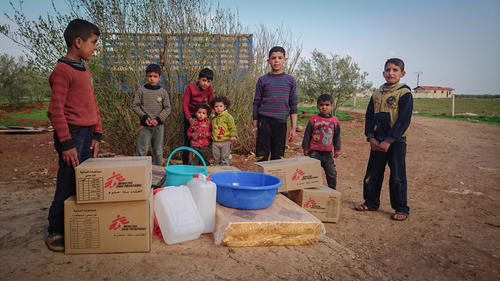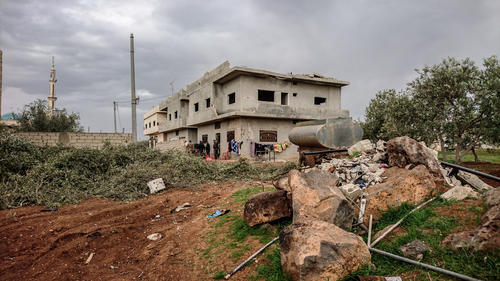With intensive care units full and medical supplies running out, east Aleppo’s seven hospitals cannot cope for much longer, says surgeon Dr Abu Huthaifa.
"We've got used to the daily scenes following a mass bombing, when hospitals are so crowded with wounded that we have to step over people to reach other patients in need," says Dr Abu Huthaifa, one of the few remaining surgeons in east Aleppo. "At these times, we ask for help in the emergency room from everyone who is available – caretakers and cleaners as well as health workers – to apply pressure to patients’ bleeding wounds, administer basic dressings, triage people according to the severity of their injuries, and move those who can be saved into the operating theatre."
The three-month-long siege of east Aleppo and the relentless bombing over the past three weeks are taking a deadly toll on the estimated 250,000 people trapped in the besieged area. Medical care has also been a victim of the blockade and the bombs, with just 35 doctors remaining, and only seven hospitals still functioning. Three weeks ago there were eight, but one hospital has since closed after being hit several times during the aerial bombing campaign.
"There's a shortage of medical staff," says Dr Abu Huthaifa. "Many were visiting their families and relatives outside Aleppo when the siege started, so they got stuck outside. There is also a lack of fuel, which we need to keep the hospitals' generators running 24/7, as there is no electricity supply in east Aleppo. There's a shortage of medical supplies, as well as of drugs and intensive care beds."
Before the siege, many patients in need of long-term intensive care were referred to other cities in Syria, or else to Turkey. "Now, under the siege, we cannot do that," says Dr Abu Huthaifa. "Sometimes we are forced to take a hopeless patient off life support in order to give another person with a better outlook a chance of survival.”
For the past three weeks, the situation in the east Aleppo's hospitals has been desperate, with services overwhelmed by the number of injured. "We received a patient wounded in an airstrike and he needed a laparotomy," says Dr Abu Huthaifa, "but all the operating theatres across Aleppo were full. We couldn't act until one became available. He died because there was no space in any operating theatre for us to perform the surgery.”
In these circumstances, just finding time to eat or sleep can be a struggle, says Dr Abu Huthaifa. "When one patient leaves the operating theatre, and as another is brought in, we do things like praying or eating". We've been working almost 24/7 and we've been receiving wounded people around the clock. Sometimes we try to sneak a nap between two surgeries – we try to sleep for half an hour to gain the strength to perform another surgery."
Although hospitals had prepared for the eventuality of a siege by stockpiling medical supplies, according to Dr Abu Huthaifa these are now running very low.

He describes what is likely to happen if no aid is allowed into the besieged area. "We could fail to save many of our patients, because of the lack of fuel to run the generators, or because we have no space in the intensive care unit. Some patients need intensive care beds for a month or two, according to their injuries; patients with brain injuries need intensive care for a long period of time. With patients who have lost a lot of blood, we may not find the matching blood type, because most people in east Aleppo have already donated blood, many of them tens of times over. And we may not have medical supplies or sutures for performing surgery." Dr Abu Huthaifa is also concerned about children going unvaccinated, and the unavailability of formula milk for babies, and of fresh vegetables and food in general.
The ambulance service has also been heavily impacted by the siege and the indiscriminate bombing of the city, with terrible consequences. "We received one patient at 4am," says Dr Abu Huthaifa. "A bomb had exploded next to his house while he was sleeping and he was hit by shrapnel in the chest. His family tried to get him to hospital as quickly as possible, but because of the shortage of ambulances, due to the lack of any kind of fuel to run them, the man arrived dead an hour and a half after being injured. And all because there was no vehicle to bring him to hospital.”
As protection from shelling, the hospitals are using basements or the lower floors of buildings only, says Dr Abu Huthaifa.
Summarising the situation in east Aleppo's remaining hospitals, Dr Abu Huthaifa says, "The general scene is wounded bodies all over the place. I'm not sure if this is normal or not, but we have got used to this because it's so frequent. We have to deal with these victims and treat them as soon as possible with what we have, and with what our hospital can provide, no matter how modest."






